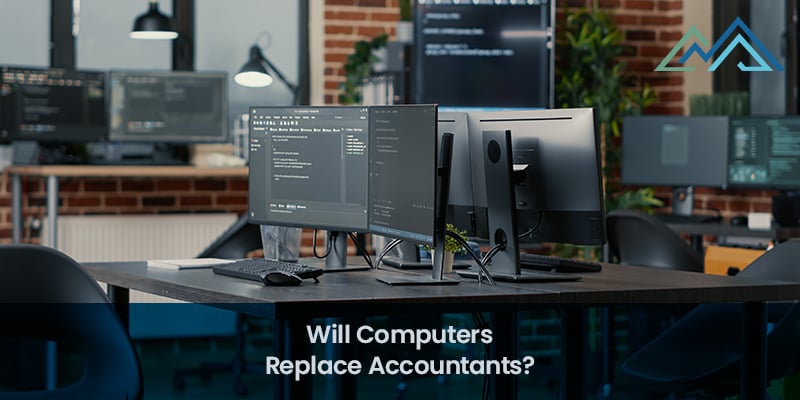If you’re a fan of science fiction, you know there are a ton of stories about machines taking over from humans. And, if you’re paying attention, you’ve probably noticed that artificial intelligence (AI) is in the news a lot these days. Put those two things together and you might wonder if science fiction is becoming reality.

At CMP, we often hear from clients who want to know if computers will replace accountants in the future. A cursory glance at the headlines might suggest that the answer is yes, but we disagree.
Automation in Accounting
There’s no question that computers have changed accounting. Work that used to be done by hand – things like journal entries and invoices – can now be automatically generated by computer programs. If you use QuickBooks for your business, you know that many of the repetitive tasks that used to require valuable time can now be done instantly.
In many ways, automation is a good thing for businesses. Using a well-designed accounting or bookkeeping program can save hours of time. It can also eliminate many “human error” mistakes that can cost you in terms of accuracy.
It’s understandable to wonder how far automation can go. An Australian study from 2015 concluded that accountants and bookkeepers were at the highest risk of being eliminated by automation. However, that study fails to take one important thing into consideration.
Much of the accounting and bookkeeping work that can be automated is work that is preliminary to accountants doing their jobs. An accountant who spends valuable time doing data entry, such as entering transactions into a log, is only doing the work that’s required to set up their real work. Automating that part of their jobs would not eliminate the need for accountants. Instead, it gives accountants more time to focus on the most important parts of their jobs.
Another way to look at it is that automation will force accounting to evolve. That’s a good thing. The rise of computers has already changed accounting for the better, streamlining processes and improving accuracy. It’s up to accountants to embrace the technology that enhances the services we provide to our clients.
Artificial Intelligence in Accounting
Automation is one thing, and artificial intelligence is another. There’s no question that the past several years have brought AI into the mainstream. More companies than ever are using AI to eliminate repetitive tasks, streamline business processes, and assist clients.
The simplest form of AI is the customer service chatbot. A chatbot can be helpful when it comes to doing things like:
- Redirecting customers to self-service options (password resets are a good example)
- Triaging incoming service requests and routing them to the proper agent
- Providing answers to simple questions
Some financial institutions are using chatbots, although there is certainly a learning curve. Clients may be comfortable trusting a chatbot to find them a pair of khakis in their size, but it’s different from trusting one with sensitive financial data.
In accounting, artificial intelligence can be used to take some decision-making out of human hands. An example would be matching up invoices and payments. Because incoming checks may not always match invoices to the penny, there is a decision-making element to that task that can be handled by AI.
Here again, there’s the potential for accounting firms to embrace the changes AI brings rather than resist them. AI can make accountants more efficient by eliminating redundancies. It’s a good thing for both accountants and their clients if accountants have the time to review a detailed analysis of the numbers.
The Human Element of Accounting
Artificial intelligence and automation aren’t going away, but that doesn’t mean that human accountants must worry about becoming obsolete. In fact, the reverse is true. As much as it might be tempting to think of numbers as impersonal and cold, a human accountant brings some things to the process that simply can’t be replaced by a computer.
Human Instinct
The first human element to consider is instinct. When you work in accounting for years, you develop a sort of sixth sense about things. You might call it a gut instinct. Years of experience can leave an accountant with the ability to spot a problem long before it becomes apparent in the numbers. It’s easy to underestimate the human brain when it’s compared to a computer, but we also need to remember that only about 5% of our thinking is conscious.
Human Experience
Experience is another thing that can’t quite be replicated in a computer. A computer can evaluate numbers, and in many cases, more quickly than a human could. What they can’t do is remember similar experiences from the past and make connections between clients. They can only address the task at hand. A human accountant can draw on personal experience and professional experience to assist clients.
Human Trust
One of the things we value most at CMP is the trusting relationships we build with our business clients. While a computer might be accurate and speedy, it can’t connect with a client the way a human being can. Our clients trust us because we know their businesses. We know about their personal lives and goals. That’s something that a computer simply can’t replicate.
Human Interaction
There’s no question that artificial intelligence can do remarkable things. If a virtual agent is properly programmed, it can carry on a realistic conversation using natural language processing (NLP). But no matter how well it works, it can’t truly replicate the experience of talking to another human being. It can’t pick up on non-verbal clues and nuances, and it can’t register implied meanings. AI can communicate, but it can’t replace human conversation.
Human Compassion
An element of accounting that doesn’t get discussed much is compassion. Small business owners have a personal stake in their companies. They may have started their business on a shoestring budget. The company’s successes and failures affect how they think of themselves. In other words, business is personal.
As efficient and accurate as a computer might be, it will never be able to understand the human emotions that go into building a successful business. They can’t see the look in a business owner’s eyes as she contemplates the future of her company.
Just as importantly, a computer can’t make allowances for the emotions of a client. Sometimes, our clients make mistakes and need help to correct them. That may require careful planning and meticulous decision-making. Computers can make easy decisions (does this invoice match that check?), but they can’t decide on a debt reduction strategy that will allow a business owner to sleep at night. Only a human accountant can do that.
In other words, machines don’t understand what it is to be human. They can provide, in some cases, a realistic facsimile of humanity, but they are still just machines.
Conclusion
Computers are essential tools that help accountants do their jobs quickly and accurately. There’s no question that automation and artificial intelligence have changed the game in accounting. But, in the end, they are tools to make accountants better at their jobs, not replacements for a relationship with a human accountant who understands your finances.
If you have any questions and are ready to learn how our human accountants can help you with your finances, contact our team by clicking below.


















